Moringa is a genus of trees and shrubs that belongs to the Brassica family — a
relative of collards, kale, and broccoli. So you can think of it as a giant vegetable, the kind that might appear in a fairy tale called Jack and the Broccoli Stem. And while the entire tree is edible (including the bark and roots), the leaves and seeds are the most commonly eaten part of the plant.Originating in India, the moringa tree (Moringa oleifera) prefers tropical and subtropical climates where it can grow to heights of over 40 feet. Several moringa species are native to South Asia and East Africa, as the trees can also thrive in tropical drylands. Today, it is widely cultivated in other areas around the globe including the Pacific Islands, Latin America, and even California.
Sometimes called the drumstick tree or horseradish tree, moringa is a drought-tolerant plant that produces aromatic, yellowish-white flowers that are also edible and make wonderful herbal tea. You can eat the young seedpods like green beans when tender. And the leaves are edible fresh or used as a powder when dried and ground up. The foliage has a mild, peppery taste similar to that of arugula, while sweeter than kale.
Though it is grown primarily as a food crop, moringa also boasts a tradition of medicinal uses dating as far back as ancient Egyptian times, when the oil derived from its seeds was used in skin ointments. In addition to providing vital food and medicine, moringa seeds can purify water, and the quick-growing wood is a potent source of fuel.
How Nutritious Is Moringa?
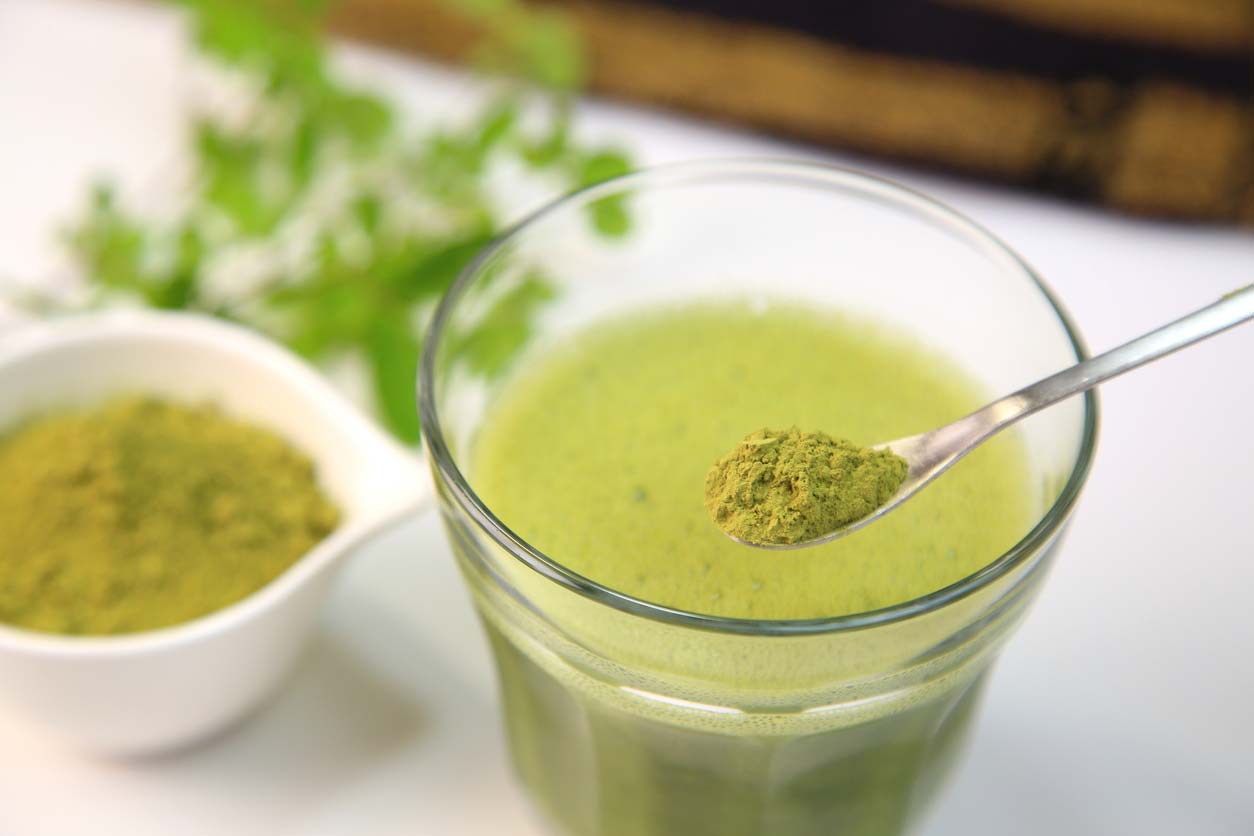
Every part of the moringa tree is a storehouse for important nutrients. In fact, one researcher claimed that moringa is the “most nutritional plant yet discovered.” Others have said that there is likely no plant equal in terms of its combination of nutritive, medicinal, and disease preventative value. Those are big claims — things you’re more likely to hear in a late-night infomercial or from a company about to get sued by the FDA for false advertising. But these moringa promoters are sober, serious scientists. So what are they seeing that have them gushing about moringa in such enthusiastic tones?
Moringa leaves are rich in vitamins, essential minerals, and antioxidative phytocompounds like polyphenols and carotenoids. In fact, when moringa competes with other nutrient gold medalists, it wins just about every time.
What food comes to mind when you think of vitamin C? Oranges, right? Well, moringa is reported to provide seven times the vitamin C for the same weight of oranges. And while bananas are known as the potassium champs, moringa contains 15 times the potassium found in bananas. Then there’s beta-carotene, which comes from carrots (in fact the “car” in “carotene” comes from carrots). Yet moringa gives you 10 times as much beta-carotene. Moringa leaves also contain more than four times as much calcium and 25 times as much iron as spinach — minerals that are essential for growth and development. Plus, the plant is high in fiber, which makes your microbiome happy.
Just 25 grams of dried moringa powder provides a child with all the daily vitamin A and calcium they need, and a decent bit of protein too. And in addition to being protein-rich, moringa leaves also have a favorable balance of amino acids and generous amounts of both omega-3 fatty acids and selenium.
Moringa Leaves Nutritional Profile
Because this impressive nutritional profile grows in arid climates and in poor soil, moringa has been recognized as a vital source of both child and maternal nutrition — especially in poor or rural areas that are nutrient-deficient.
A 100 gram serving of fresh moringa leaves boasts the following nutritional composition:
- Calories: 92
- Protein: 6.7 g
- Fat: 1.7 g
- Carbohydrate: 13.4 g
- Vitamin A: 6.8 mg
- Vitamin C: 220 mg
- Calcium: 440 mg
- Potassium: 259 mg
- Iron: 7 mg
Bear in mind that the seeds, pods, and dried leaf powder of moringa each have distinct nutrient profiles.
7 Moringa Health Benefits
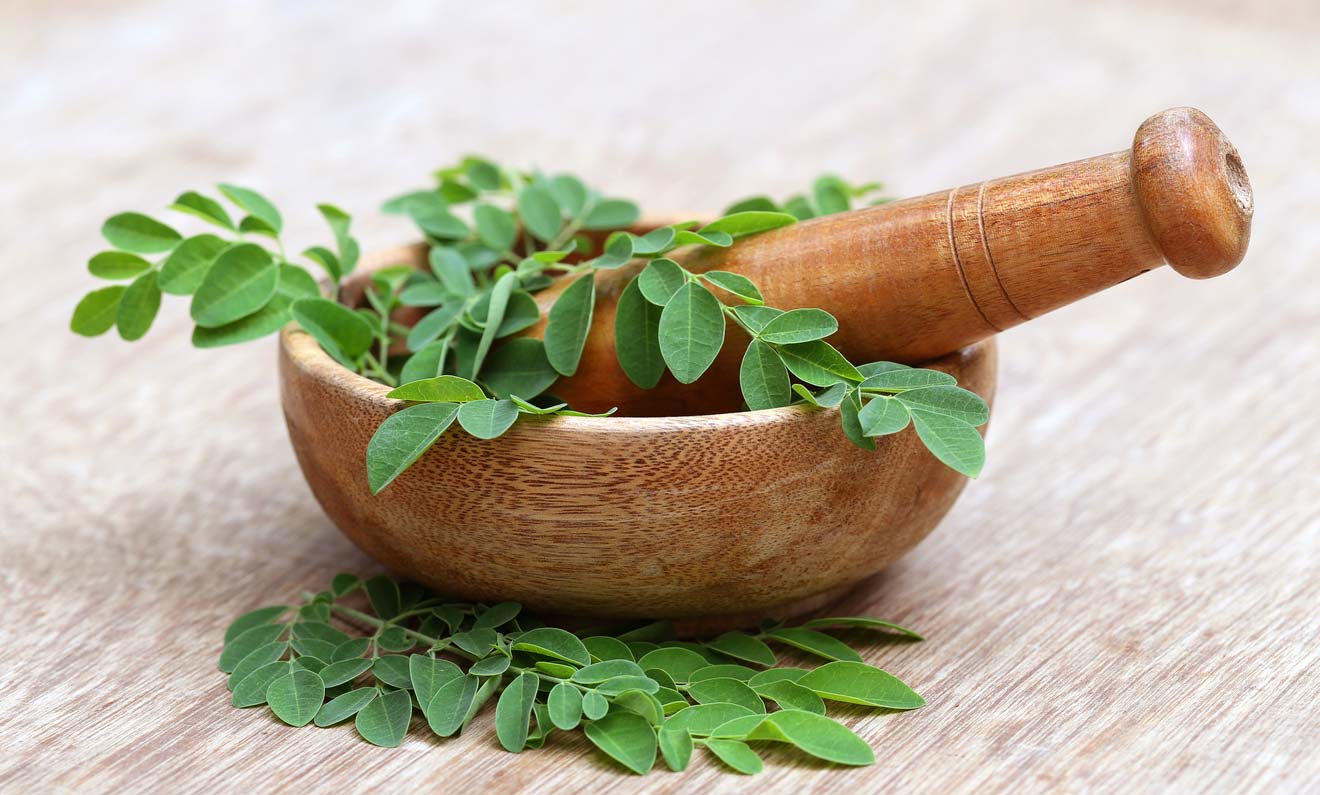
For a crop that most Westerners have never heard of, this “miracle tree” may have earned its namesake with a diverse array of nutrients and compounds clinically shown to provide many health benefits.
1. May reduce chronic inflammation and associated illnesses.
Case-control studies on humans and animals in recent years show that eating moringa leaves may help reduce chronic and acute sources of inflammation. Studies have suggested that phytonutrients found in moringa — namely, the flavanols and phenolic acids — significantly reduce cytokines and other biological markers that cause inflammation.
When examining edema (swelling caused by excess fluid) in the limbs of rats, researchers found that administering moringa seed extract (MSE) reduced inflammation to a degree comparable to the effects of aspirin.
2. May help fight diabetes and regulate blood glucose levels.
Researchers have amassed impressive evidence to suggest that moringa can effectively combat acute hyperglycemia (high blood sugar) — one of the primary effects of diabetes. Furthermore, emerging research suggests that moringa could function as an effective long-term treatment for the disease due to its ability to help regulate metabolic processes.
More than 20 studies conducted on rats and mice show that the administration of various forms of moringa extracts is effective as standard hypoglycemic treatments for diabetic rodents. According to a December 2019 review paper, the jury is still out on whether humans can similarly benefit. The authors conjecture that the presence of terpenoids in the plant is responsible for improving insulin sensitivity and reducing blood glucose to normal levels. Additionally, moringa leaf extract appears to have the potential to reduce the complications associated with diabetes by mitigating renal damage and reducing inflammation caused by the disease.
3. May offer protection from microbial infections.
A diet rich in whole foods and leafy greens, in general, may help protect us against infectious disease. But moringa, in particular, boasts an impressive array of antimicrobial properties in virtually every part.
Extracts from various parts of the plant have displayed the potential to combat isolated strains of bacteria and fungi. A 2018 review of clinical studies reported that juice from moringa stem bark exhibits an antibacterial effect against Staphylococcus aureus (staph or MRSA), an antibiotic-resistant bacterium that can cause sepsis or even death. What’s more, moringa leaf extract demonstrated effective growth inhibition against Streptococcus, the bacterium responsible for strep throat.
In a 2014 study, clinical researchers also examined moringa bark extract as a treatment for urinary tract infections. Of those in the trial group treated with moringa, 66% of patients were completely cured of their symptoms, and only 6% relapsed.
4. May protect against oxidative stress.
Many fruits and vegetables contain beneficial polyphenols and other antioxidants. And the high concentration of polyphenols found in the moringa tree suggests that it is a particularly effective ally in reducing the harmful effects of oxidation in our cellular tissues. In a three-month comparative study, moringa leaf powder was shown to increase blood levels of bioavailable antioxidants by 44% and decrease oxidative stress markers by 16% in postmenopausal women.
And in vivo studies (those done on living creatures, rather than in test tubes) of topical moringa stem extract applications show a significant reduction in oxidative stress caused by UVB radiation — confirming its effectiveness in anti-aging cosmetics.
5. May inhibit or prevent cancerous growth.
Incorporating moringa into your diet may be an effective way to prevent or treat certain types of cancers. A 2015 review reported on several studies that found moringa leaf extract had “remarkable” anticancer effects on lab-cultivated cells including pancreatic cancer cells, liver cancer cells, colon cancer cells, and leukemia cells.
Another report from 2018 details a study that isothiocyanates found in moringa leaf extract reduced tumor growth in rats by 43%. While we still need to run clinical trials on humans, numerous epidemiological studies show the potential for moringa extracts to serve as effective therapeutic and preventative cancer treatments.
6. May improve memory and reduce the risk of Alzheimer’s.
It’s increasingly well documented that a diet rich in fruits and vegetables can help to preserve your cognitive function and prevent Alzheimer’s disease. Now we have a growing body of evidence that consuming moringa might be an especially easy and potent way to love your brain.
Neurodegeneration (otherwise known as “brain rust”), refers to the neurological damage caused by oxidative stress in our brains. It can result in diseases like dementia and Alzheimer’s. And while the effects of oxidation can increase as we age, certain plant compounds like antioxidants are known to be neuroprotective, mitigating the effects of brain rust over time.
Not only is the moringa tree rich in antioxidants that fight oxidative stress in the brain, studies show that moringa leaf extract can stimulate the development of neurons and help regulate signaling pathways in the brain. The combinative effect can help improve spatial memory and reduce the effects of neurodegeneration.
7. May reduce LDL cholesterol levels
High levels of LDL cholesterol are linked to a greater risk of cardiovascular disease. The good news is that a review of clinical studies that examined the therapeutic effects of moringa extract showed that the plant can lower LDL cholesterol in both humans and animals.
Potential Risks of Moringa
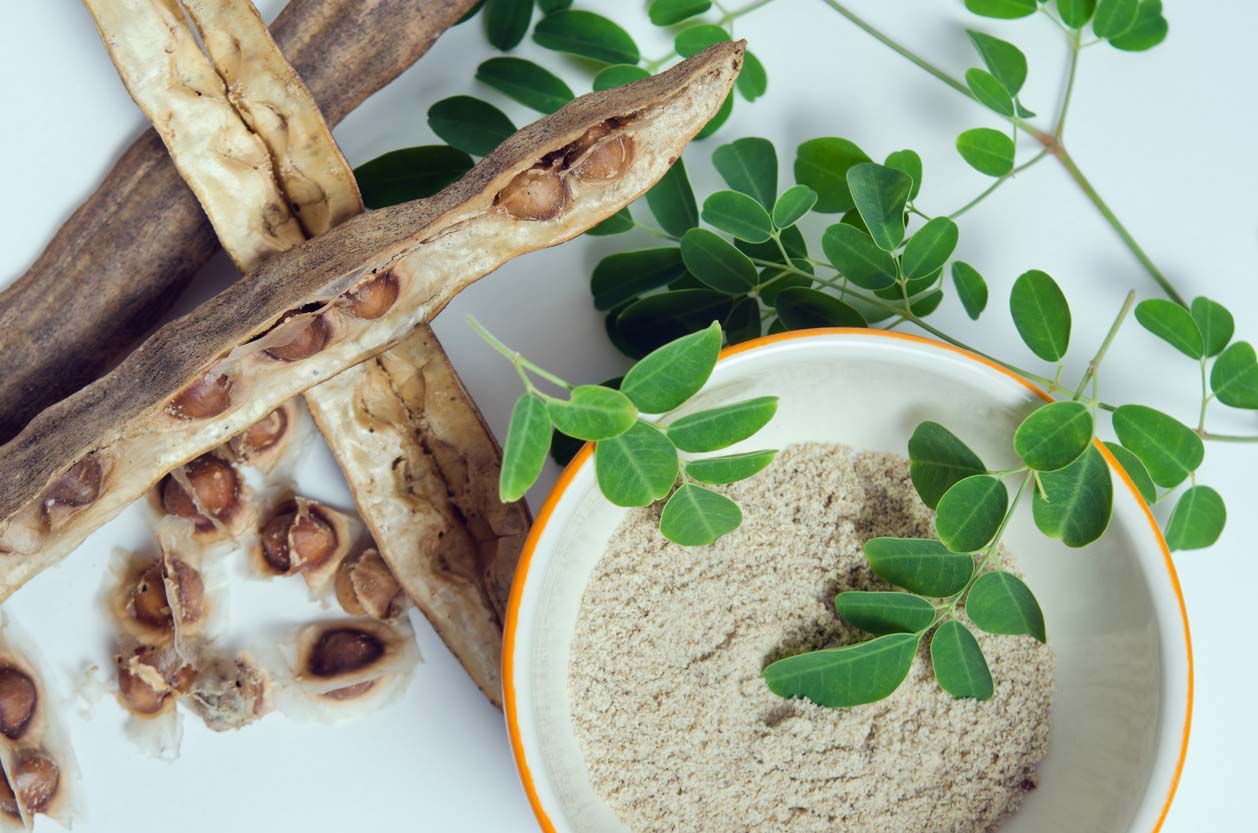
While the miracle tree appears to perform as a health superstar, there are a few things to consider before having a tractor-trailer’s worth of moringa leaf extract delivered to your home.
Like many plants, moringa contains a variety of micro and macroelements that could pose certain undesirable effects when ingested in large amounts over a period of time. For instance, in toxicology studies on rats, researchers discovered that liver enzyme production may be impacted with very high doses of moringa root extract. However, the same research also concluded that there were no overt adverse reactions in any of the test subjects.
Toxicity reports have identified two known alkaloids, as well as a toxic hypotensive compound called moringinine, in moringa root bark. The same compounds are found in the root flesh as well, though in much lower concentrations. These compounds are benign in low doses but can become potentially dangerous in high concentrations. Some in vivo studies show a depressant-like effect that temporarily reduced the heart rate of rats. But in all likelihood, this would not occur unless you plan on consuming very large amounts of moringa root.
Pregnant people may also want to avoid moringa leaves during pregnancy. In a 2015 experimental study, rats who were fed ground moringa leaves in their first trimester of pregnancy showed little weight gain and did not produce a litter. While the reasons are unknown, it may be advisable for anyone who’s pregnant or considering getting pregnant to abstain from eating moringa.
While it is always possible to have “too much of a good thing,” on the whole, it seems that as long as you aren’t pregnant, and you don’t overindulge yourself, moringa’s risks are low.
Socio-Environmental Impacts of Moringa
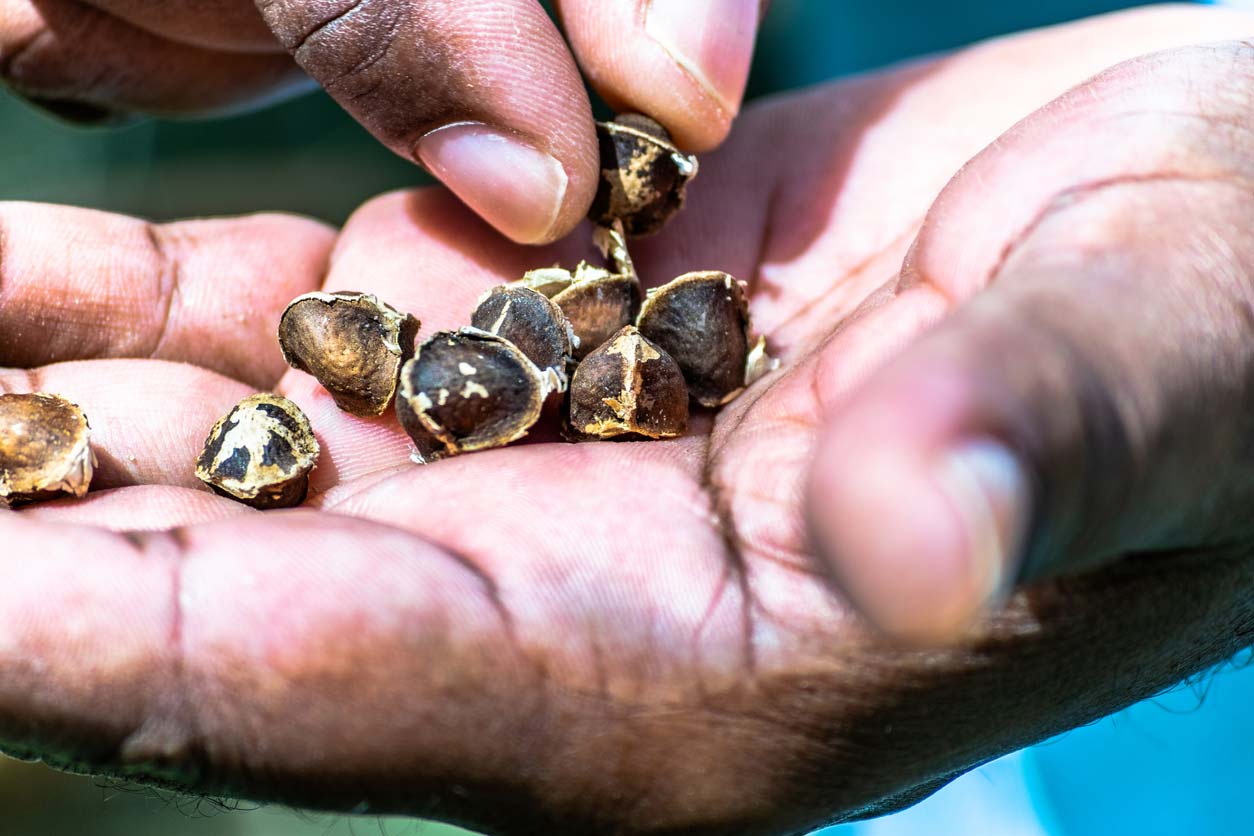
As I indicated at the start of this article, moringa is more than just a nutritious addition to your diet. Its nickname, “Tree of Life,” is a clue that it’s a highly sustainable tree with many practical uses — some of which might contribute to reversing climate change and providing well-being to some of the world’s most vulnerable people. Let’s take a deep dive into the socio-environmental healing potential of moringa.
Moringa is more than just a nutritious addition to your diet. Its nickname, “Tree of Life,” is a clue that it’s a highly sustainable tree with many practical uses — some of which might contribute to reversing climate change and providing well-being to some of the world’s most vulnerable people.
1. Fighting Climate Change & Revitalizing Soil
Research published in 2018 by the International Journal of Agriculture and Biology shows that moringa sequesters more carbon than other drought-tolerant species. Not only does it capture carbon in the plant itself, but it also helps to nutrify and carbonize depleted soils — in essence, restoring fertility to the land. Knowing its potential to combat the climate crisis, some companies are planting moringa in order to reverse the effects of desertification in arid regions. Imagine — a forest of 60,000 life-giving, miracle trees!
2. Fighting Malnutrition
The range of moringa cultivation is vast because it grows prolifically even in unhealthy soils. Soil nutrient deficits can eventually lead to increased disease, which, combined with other societal constraints, perpetuates a cycle of chronic malnutrition. Remarkably, moringa thrives in many of the very tropical and subtropical regions where malnutrition is most prevalent
In poverty-stricken communities, the myriad applications of moringa — from medicine to fertilizer to food — have the potential to break devastating cycles of poverty and resource depletion.
3. Purifying Water
Perhaps one of the most fascinating documented uses of moringa involves its seeds. Containing water-soluble proteins that act as a coagulant, crushed moringa seeds, used by rural communities, function as an affordable way to filter turbid river water. And recent studies show that moringa seed waste can act as an antimicrobial agent and even remove heavy dyes from industrial wastewater. Since seed waste material is a byproduct of oil extraction, this process is considered a green and holistic approach to improving water quality.
4. Supporting Small-Scale Farmers
In addition to purifying water, mitigating climate change, and providing nutritious food, there are still other notable socio-economic benefits associated with the cultivation of moringa. Many small-scale farmers in rural Africa often struggle with depleted and eroded soils. Since, as we’ve seen, moringa can help replenish the soil, it can also provide a livelihood to small-scale farmers.
Where to Find Moringa
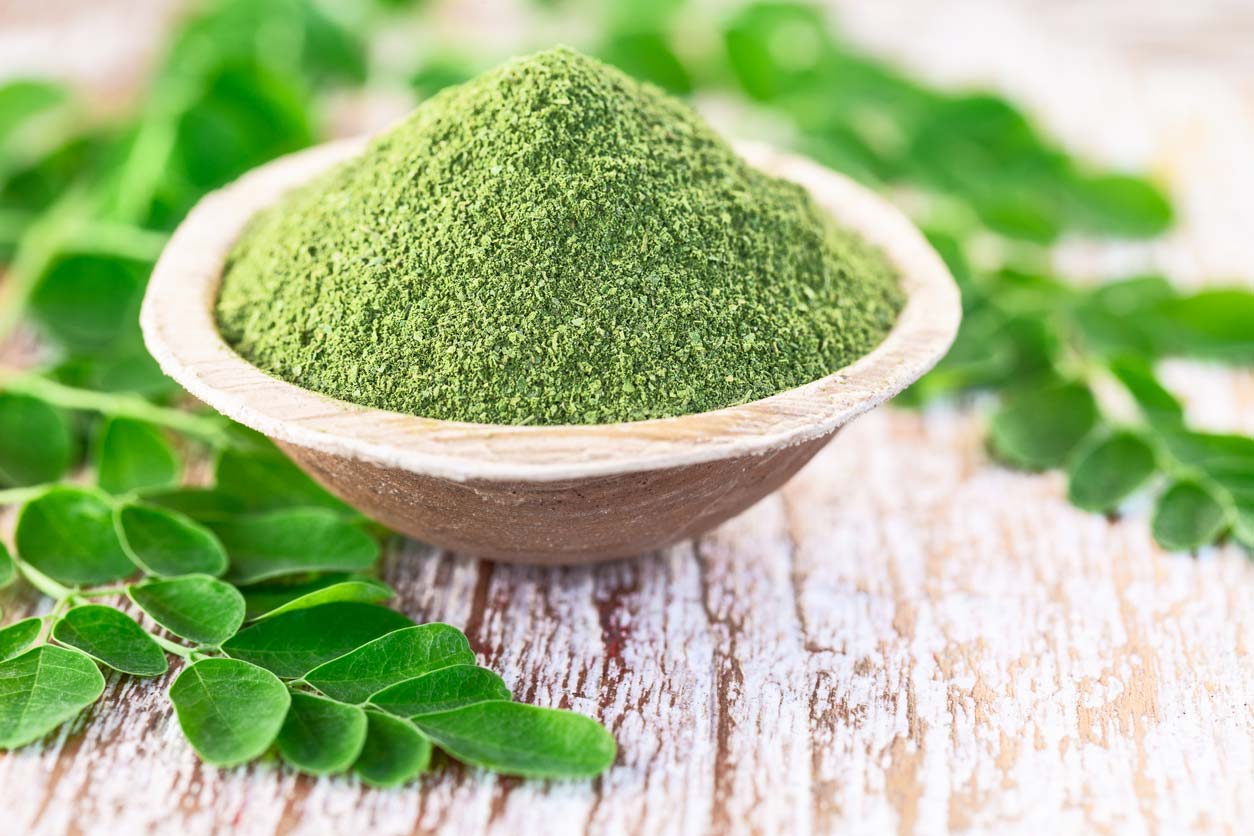
If you live in North America, you may be hard-pressed to find fresh moringa leaves or pods. You’ll most often find it sold as a powder, a liquid extract, or in capsules as a supplement. Perhaps you’ve already encountered some form of the plant at your local juice or smoothie bar!
It’s also commonly found as an additive ingredient in energy bars or other processed nutritional foods. Additionally, many brands are starting to offer moringa teas or blended herbal teas that feature moringa.
The best place to find moringa locally is likely at health food stores and natural food co-ops. Some pharmacies may carry supplement varieties of moringa in capsules or tinctures. And although the seeds, oils, and leaves are more difficult to track down, you can purchase them online or from a local grower. You can also find powdered organic moringa leaf sold online from vendors like this. If you’re lucky, your local Indian market may sell fresh or frozen moringa leaves as well.
There are a great many advantages to eating food that’s grown locally. It’s often safer, healthier, fresher, and more sustainable. If moringa doesn’t grow in your region, then you may have a trade-off to reconcile. On the one hand, moringa can bring considerable nutritional benefit, and buying it is a way to support farmers growing more of it. But on the other hand, it might require shipping, which, of course, brings its own set of ethical questions.
Wherever you purchase your moringa from, be sure to give preference to products that are organic and/or fair-trade certified if you can.
The Best Ways to Eat Moringa
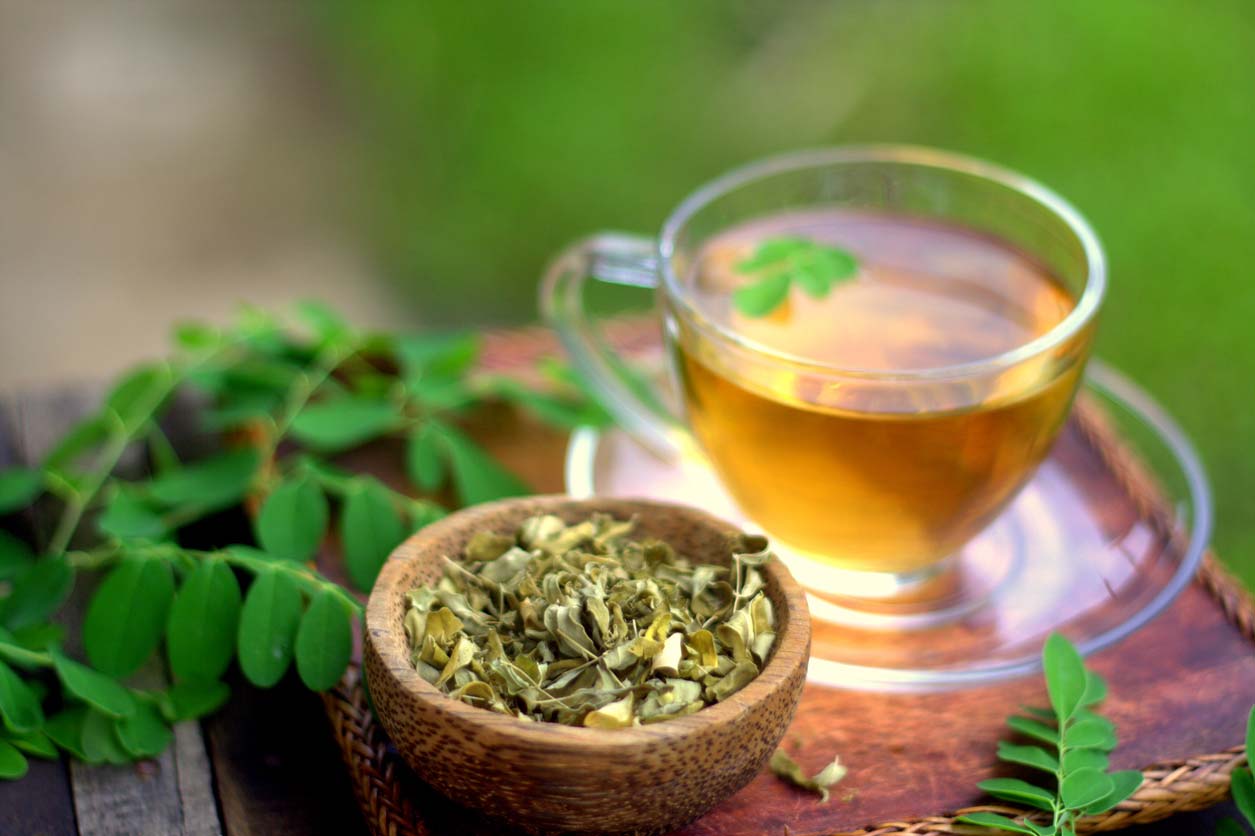
For many people, dried or powdered moringa is the easiest way to incorporate it into your diet. Mixed easily into smoothies, teas, or stews, the nutrient-dense powder provides a quick boost of nourishing goodness. For breakfast, you can add the powder to a pancake mix or sprinkle it over oatmeal. For on-the-go snacking, you could also use it to fortify homemade energy bars. The sky’s the limit with powdered moringa!
Less readily available but just as nutritious are the whole leaves, pods, and seeds. Tender moringa pods function much like green beans and are delicious both raw or cooked. However, you may want to avoid “woody” pods that may be less palatable and could cause indigestion. Many Indian dishes like curries and kormas call for moringa pods and leaves. So long as they are fresh, you can easily add them to soups, stews, and stir-fries without much fuss.






Комментариев нет:
Отправить комментарий